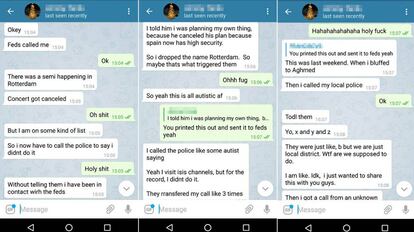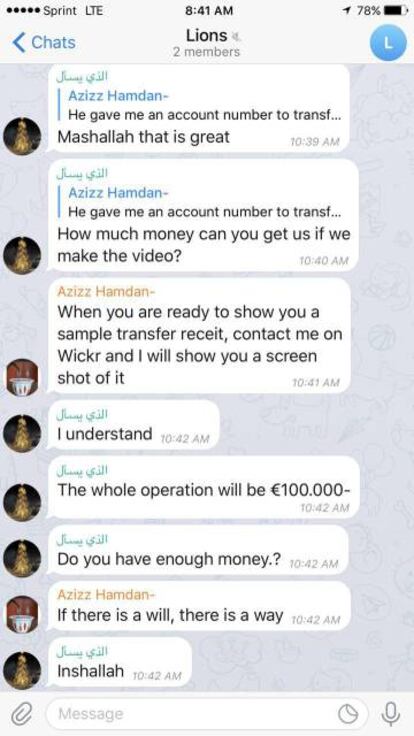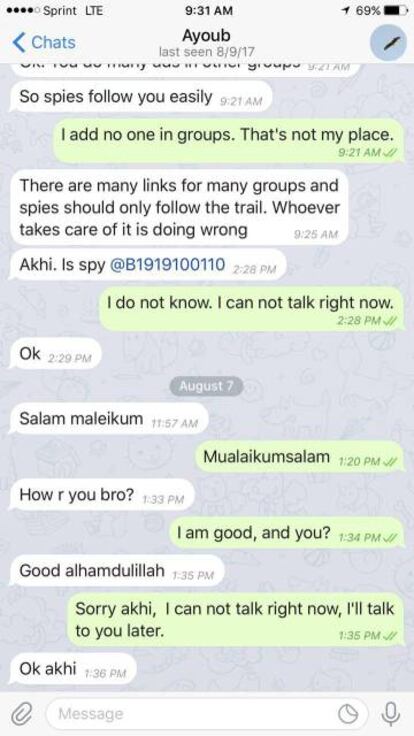How online amateur “jihadist hunter” sparked terror alert in Rotterdam
Police were monitoring chat between Dutch national and alleged radical in wake of Catalonia attacks
A few hours before Dutch security forces raided the home of Jimmy F. in the early hours of August 23 in Zevenbergen, a small town some 40 kilometers south of Rotterdam, the 22-year-old had been chatting online using a false identity with an alleged Jihadist calling himself Ayoub. “I told him I was planning my own thing, because he canceled his plan because spain [sic] now has high security [following the attacks in Catalonia in mid-August]. So I dropped the name Rotterdam. So maybe thats [sic] what triggered them,” he wrote in a series of text messages to a friend about the terror scare he triggered.

Unwittingly, Jimmy F. had prompted the Spanish security services, who had been monitoring his conversation with Ayoub, to issue a terrorist alert, prompting the authorities in Rotterdam to cancel a concert and arrest him. He denies any links to terrorists, describing himself as a “jihadist hunter.”
EL PAÍS has had access to the online conversations Jimmy F. held with alleged Islamic radicals, which read like something from a novel, and reveal activities that were until now the preserve of the deep web: the search for terrorists by infiltrating online jihadist networks.
He has been fascinated since childhood with the war in Syria Jimmy F.’s lawyer
Jimmy F. believed he had uncovered something important when he contacted a jihadist online, but when he suggested that he was planning his own attack in Rotterdam, the Spanish security services immediately contacted their Dutch counterparts. A concert was cancelled that night in the port city, while a Spaniard driving a van containing gas canisters – and who turned out to be drunk – was arrested close to the stadium where the event was to be held. He was later released.
While all this was going on, Jimmy F. was telling his friends what had happened. “Concert got canceled. But I am on some kind of list So now I have to call the police to say I didnt [sic] do it Without telling them I have been in contact with the feds.”

Karianne Bal, Jimmy F.’s lawyer, says that the 23-year-old called the local police on several occasions to inform them of his activities, but they did not pay much attention to his story. At 2am on August 24, according to Dutch television channel NOS, special forces raided Jimmy F.’s home and arrested him.
Jimmy F. is studying security at a community college in Zevenbergen, and is a member of Syria General, an online group that discusses the war in Syria. His lawyer says he has been “fascinated since he was a child with the political and economic aspects of the war, but nothing else.” She describes him as an “amateur spy” and a “jihadist hunter.”
“He had no plans for any kind of attack and mentioned Rotterdam unaware that there was a concert. He believed he was talking to a jihadist who did have plans and he hoped to find out more about them,” concludes his lawyer.
Dutch prosecutors say Jimmy F., who is being held in custody, could face charges of involvement in a terrorist threat. The Dutch media say that the judge overseeing the case has told prosecutors that, for the moment, the evidence points only to a public-order disturbance.

El PAÍS has been told that Ayoub, the supposed jihadist Jimmy F. had been talking to about an attack in Rotterdam, describes himself as resident in Spain and is obsessed with the idea of recovering Al Andalus, the area covering much of the south of the country that was occupied by the Arabs for several centuries. Ayoub was also talking to another individual called Azziz Hamdan on the messaging service Telegram. An administrator on the instant messenger, a US citizen who also tries to identify jihadists online, says that Ayoub and Hamdan were trying to recruit up to 16 people to take part in an attack. In one of the chats, Jimmy F, using his pseudonym, asked Hamdan for €100,000 to record a video pledging support for the so-called Islamic State, or ISIS. “If there is a will, there is a way,” Hamdan replied.
Bal says her client was known to the Dutch security services, with whom he spoke on the day of his arrest, as well as to the police. She says that Jimmy F. provided information about a suspect named as Youad A, who was arrested in December in possession of an AK-47, along with ammunition and fireworks. The Dutch authorities have refused to comment on the case. Bal suggests that the Spanish police issued their warning about a possible terrorist attack in Rotterdam “because they didn’t know who Jimmy F. was.”
The more pressing question for both the Dutch and Spanish security services is the whereabouts of Ayoub. Jimmy F.’s colleagues say they will continue to search for him online. They say they doubt he is a member of ISIS, and suggest that he may well turn out to be another online vigilante or a member of one of Europe’s security services.
English version by Nick Lyne.
Tu suscripción se está usando en otro dispositivo
¿Quieres añadir otro usuario a tu suscripción?
Si continúas leyendo en este dispositivo, no se podrá leer en el otro.
FlechaTu suscripción se está usando en otro dispositivo y solo puedes acceder a EL PAÍS desde un dispositivo a la vez.
Si quieres compartir tu cuenta, cambia tu suscripción a la modalidad Premium, así podrás añadir otro usuario. Cada uno accederá con su propia cuenta de email, lo que os permitirá personalizar vuestra experiencia en EL PAÍS.
¿Tienes una suscripción de empresa? Accede aquí para contratar más cuentas.
En el caso de no saber quién está usando tu cuenta, te recomendamos cambiar tu contraseña aquí.
Si decides continuar compartiendo tu cuenta, este mensaje se mostrará en tu dispositivo y en el de la otra persona que está usando tu cuenta de forma indefinida, afectando a tu experiencia de lectura. Puedes consultar aquí los términos y condiciones de la suscripción digital.








































